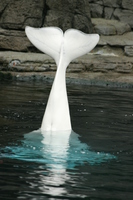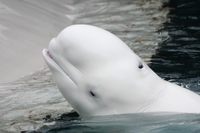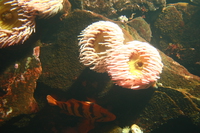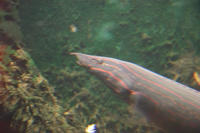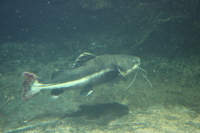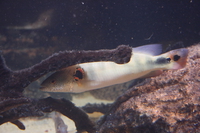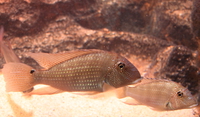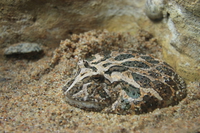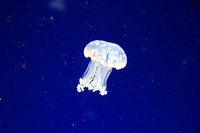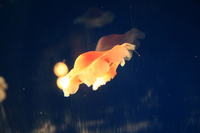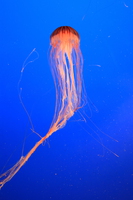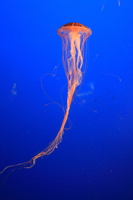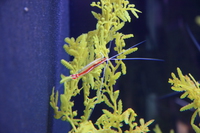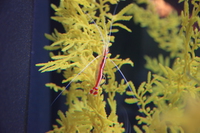aquarium
The Vancouver Public Aquarium opened its doors on June 15, 1956. Since then more than 27 million guests have visited the Aquarium. In 1967, the Aquarium was expanded to three times its original size. The natural colours and limited height of the present structure allows it to remain inconspicuous within the wooded surroundings of Stanley Park.
- The Aquarium was the first facility in the world to study a killer whale, Moby Doll (actually a young male) in July of 1964.
- In 1967, the Aquarium established the first on-site killer whale habitat, the B.C. Tel Pool.
- In September of 1975, the Aquarium became the first aquarium to be accredited by the American Association of Zoological Parks and Aquariums (AZA).
- January 1981 saw the first birth of a sea otter in an aquarium in Canada.
- In 1984, Chief of the Undersea World, sculpted by artist Bill Reid, was unveiled at the Aquarium�s entrance.
- Late in 1996, the Aquarium became the first facility in the world to undertake to never again capture, or cause to be captured, a wild whale or dolphin.
- In 1997, an Aquarium aquarist discovered a new species of shrimp in the Gulf Islands. The species has since been raised in their research lab.
The Beluga was first described by Peter Simon Pallas in 1776. It is a member of the Monodontidae family, which is in turn part of the toothed whale suborder. The Irrawaddy dolphin was also once considered to be in the same family; however, recent genetic evidence suggests otherwise.
The earliest known ancestor of the beluga is the prehistoric Denebola brachycephala from the late Miocene period. One single fossil has been found on the Baja California peninsula, indicating that the family once existed in warmer waters. The fossil record also indicates that in comparatively recent times the beluga's range has varied with that of the ice pack � expanded during ice ages and contracting when the ice retreats.
The Red List of Threatened Species gives both Beluga and White Whale as common names, though the former is now more popular. The English name comes from the Russian белуга (beluga) or белуха (belukha) which derives from the word белый (belyy), meaning "white". It is sometimes referred to by scientists as the Belukha Whale in order to avoid confusion with the Beluga sturgeon. The whale is also colloquially known as the Sea Canary on account of the high-pitched squeaks, squeals, clucks and whistles.
The beluga inhabits a discontinuous circumpolar distribution in Arctic and sub-Arctic waters ranging from 50� N to 80� N, particularly along the coasts of Alaska, Canada, Greenland and Russia. The southernmost extent of the range includes isolated populations in the St. Lawrence River estuary and the Saguenay fjord, around the village of Tadoussac, Quebec, in the Atlantic and the Amur River delta, the Shantar Islands and the waters surrounding Sakhalin Island in the Sea of Okhotsk.
In the spring beluga move to their summer grounds, bays, estuaries and other shallow inlets. These summer sites are detached from one another and a mother will usually return to the same site year after year. As their summer homes become clogged with ice during autumn, beluga move away for winter. Most travel in the direction of the advancing ice-pack and stay close to the edge of it for the winter months. Others stay under the iced area - surviving by finding ice leads and polynyas (patches of open water in the ice) in which they can surface to breathe. Beluga may also find pockets of air trapped under the ice. The remarkable ability of the beluga to find the thin slivers of open water where the dense ice pack may cover more than 95% of the sea surface is still a source of mystery and great interest to scientists. It is clear that the echo-location capabilities of the beluga are highly adapted to the peculiar acoustics of the sub-ice sea and it has been suggested that beluga can sense open water through echo-location.
The sea otter (Enhydra lutris) is a marine mammal native to the coasts of the North Pacific, from northern Japan, the Kuril Islands and Kamchatka east across the Aleutian Islands and along the North American coast to Mexico.
Adult sea otters typically weigh between 14 and 45 kg (30 to 99 lb), making them the heaviest members of the weasel family, but among the smallest marine mammals. Unlike most marine mammals, the sea otter's primary form of insulation is an exceptionally thick coat of fur, the densest in the animal kingdom with up to 400,000 hairs per cm2 (2.5 million per in2). It inhabits nearshore environments where it can quickly dive to the sea floor to forage. Although sea otters can walk on land, they are capable of spending their entire lives in the ocean.
The sea otter preys mostly upon marine invertebrates such as sea urchins, diverse mollusks and crustaceans, and some species of fish. Its foraging and eating habits are noteworthy in several respects: Its use of rocks to dislodge prey and to open shells makes it one of the few mammal species to use tools. In most of its range, it is a keystone species, controlling sea urchin populations which would otherwise inflict extensive damage to kelp forest ecosystems. Kelp forests provide crucial food and habitat for a variety of marine organisms, and help contain coastal erosion. Finally, its diet includes prey species that are also valued by humans as seafood, and this has led to conflicts with fisheries.
Dolphins are marine mammals that are closely related to whales and porpoises. There are almost forty species of dolphin in seventeen genera. They vary in size from 1.2 metres (4 ft) and 40 kilograms (88 lb) (Maui's Dolphin), up to 9.5 m (30 ft) and ten tonnes (the Orca or Killer Whale). They are found worldwide, mostly in the shallower seas of the continental shelves, and are carnivores, mostly eating fish and squid. The family Delphinidae is the largest in the Cetacea, and relatively recent: dolphins evolved about ten million years ago, during the Miocene. Dolphins are considered to be amongst the most intelligent of animals and their often friendly appearance and seemingly playful attitude have made them popular in human culture.
Every year, around 500 billion plastic bags are used worldwide. 500,000,000,000. Five hundred followed by nine zeros. That's a lot of bags. So many that over one million bags are being used every minute and they're damaging our environment.
The fire eel is an extremely elongated fish with a very distinctive pointed snout and underslung mouth. The body is laterally compressed particularly at the rear third where it flattens as it joins the caudal fin and forms an extended tail. Its colouring is dark brown/grey, while the belly is generally a lighter shade of the same colour. The pattern varies from fish to fish. Usually several bright red lateral stripes and spots mark the body. These vary in intensity depending on the age and condition of the specimen. Usually the markings are yellow/amber in juvenile fish, changing to a deep red in larger ones. Often the anal, pectoral, and dorsal fins have a red edging.
The name "eel" is a reference to the body shape; the fire eel is not a true eel.
They can often grow to a very considerable size in the wild with specimens often exceeding 1.2 m in length. However, due to the limiting factors in the captive environment they usually reach a maximum of around 55 cm even in very large aquaria.
Catfish (order Siluriformes) are a very diverse group of bony fish. Named for their prominent barbels, which give the image of cat-like whiskers, catfish range in size and behavior from the heaviest, the Mekong giant catfish in Southeast Asia and the longest, the wels catfish of Eurasia, to detritivores (species that eat dead material on the bottom), and even to a tiny parasitic species commonly called the candiru, Vandellia cirrhosa. There are armour-plated types and also naked types, neither having scales. Despite their common name, not all catfish have prominent barbels; what defines a fish as being in the order Siluriformes are in fact certain features of the skull and swimbladder. Catfish are of considerable commercial importance; many of the larger species are farmed or fished for food, and some are exploited for sport fishing, including a kind known as noodling. Many of the smaller species, particularly the genus Corydoras, are important in the aquarium hobby.
The Spotted jelly, the Mastigias papua, or the lagoon jelly is a type of jellyfish. It lives mainly in the southern Pacific Ocean. Instead of one single mouth, they appear to have several smaller mouth openings in their coral arms. These feed on zooplankton.
In Japan--especially along Pacific coast areas--these are sold as novelty pets, along with photoautotrophic phytoplankton, and are called takokurage (タコクラゲ), or "octopod" or "rammer" jellies.
They seem to have a lifespan of approximately 4 months and are active primarily in mid-summer to early-fall.
The lion's mane jellyfish (Cyanea capillata) is the largest known species of jellyfish. Its range is confined to cold, boreal waters of the Arctic, northern Atlantic and northern Pacific Oceans, seldom found farther south than 42�N latitude. Similar jellyfish (which may be the same species) are known from the seas off Australia and New Zealand. The arctic Lion's mane jellyfish is one of the longest known animals; the largest recorded specimen had a bell (body) with a diameter of 2.3 m (7 feet 6 inches) and the tentacles reached 36.5 m (120 feet). It was found washed up on the shore of Massachusetts Bay in 1870. The ribbon worm Lineus longissimus may be even longer, growing to 55 m.
The cosmopolitan Aurelia aurita is found throughout the tropics and as far north as 70� latitude and as far south as 40�. (J.E. Purcell, et al. 2001). In addition to frequenting the North American coast, they are usually found all around the coasts of the British Isles (Russell, 1953). In general, A. aurita is an inshore species that can be found in places like estuaries and harbors (Russell, 1953). They can be recognized by their horse-shoe shaped gonads. They live in ocean water temperatures that range from −6 �C to 31 �C; with optimum temperatures of 9 �C to 19 �C (Rodriguez, 1996). A. aurita prefers mildly cold salt water with consistent currents (Rodriguez, 1996). They can be found in 3 ppt salinity water but are typically found only in water with salinity above 23 ppt.
Aurelia aurita (the jelly, moon jelly fish,crystal jellyfish moon jellyfish, common jellyfish, saucer jelly or swimming jellyfish) is the most common jellyfish species found in the genus Aurelia. Other species found in the genus Aurelia besides A. aurita include A. labiata and A. limbata. There are at least 13 species in the genus Aurelia including those that are still not described (Dawson, 2003). They can be found in the Atlantic Ocean, the Arctic Ocean and the Pacific Ocean, and are common to the waters off California, Japan, the East Coast of the United States as well as Europe. The animal is translucent, can be 25-40 cm across, and has characteristic patterns of color within its body. It feeds by stinging small medusans, plankton and mollusks with its tentacles and bringing them into its body for digestion, but is capable of only limited motion; like other jellies it drifts with the current.
A. aurita and other Aurelia species feed on plankton that includes organisms such as mollusks, crustaceans, tunicate larvae, rotifers, young polychaetes, protozoans, diatoms, eggs, fish eggs, and other small organisms. Occasionally, they are also seen feeding on gelatinous zooplankton such as hydromedusae and ctenophores (Rodriguez, 1996). Larvae of A. aurita have nematocysts to capture prey and also to protect themselves from predators. The food is tied with mucus, and then it is passed down by ciliated action down into the gastrovascular cavity where digestive enzymes from serous cell break down the food. There is little known about the requirements for particular vitamins and minerals, but due to the presence of some digestive enzymes, we can deduce in general that A. aurita can process carbohydrates, proteins, and lipids (Arai, 1997).
The stinging sea nettle (Chrysaora quinquecirrha) is a species of jellyfish occurring particularly in Atlantic estuaries. It is a bell-shaped invertebrate, usually semi-transparent and with small, white dots and reddish-brown stripes; Sea nettles without stripes have a bell that appears white or opaque. The nettle's sting is rated from "moderate" to "severe" and can be pernicious to smaller prey; it is not, however, potent enough to cause human death, except by allergic reaction. While the sting is not particularly harmful, it can cause moderate discomfort to any individual stung. The sting can be effectively neutralized by misting vinegar over the affected area. This keeps unfired nematocysts from firing and adding to the discomfort.
The sea nettle is radially symmetrical, marine, and carnivorous. Its mouth is located at the center of one end of the body, which opens to a gastrovascular cavity that is used for digestion. It has tentacles that surround the mouth to capture food. Nettles have no excretory or respiratory organs. Each sea nettle is free-swimming and can reproduce both sexually and asexually.
Stinging sea nettles are carnivorous. They generally feed on zooplankton, ctenophores, other jellies, and sometimes crustaceans. Nettles immobilize and obtain their prey using their stinging tentacles. After that, the prey is transported to the gastrovascular cavity where it is subsequently digested.
Nettles also eat young minnows, bay anchovy eggs, worms, and mosquito larvae.



